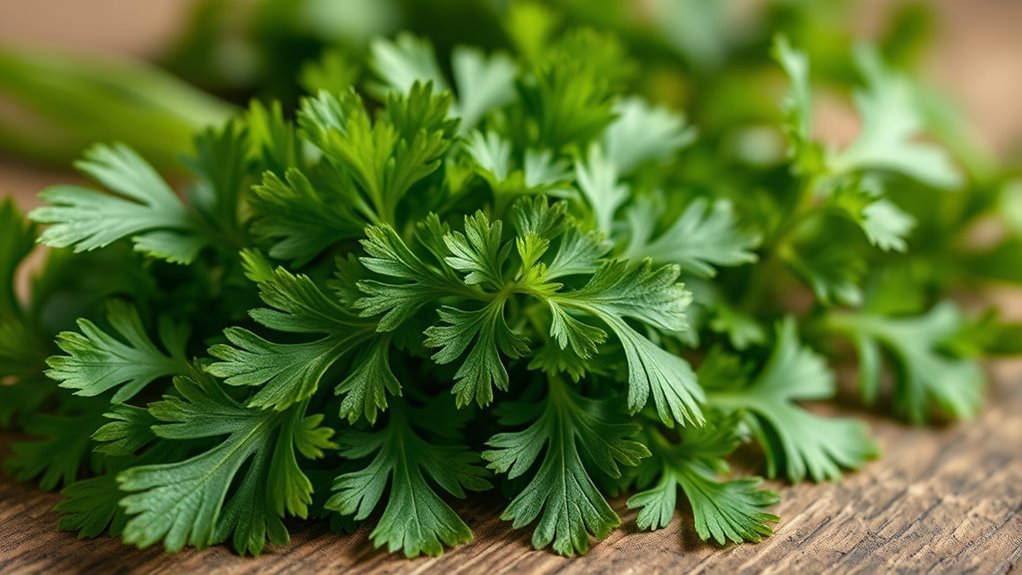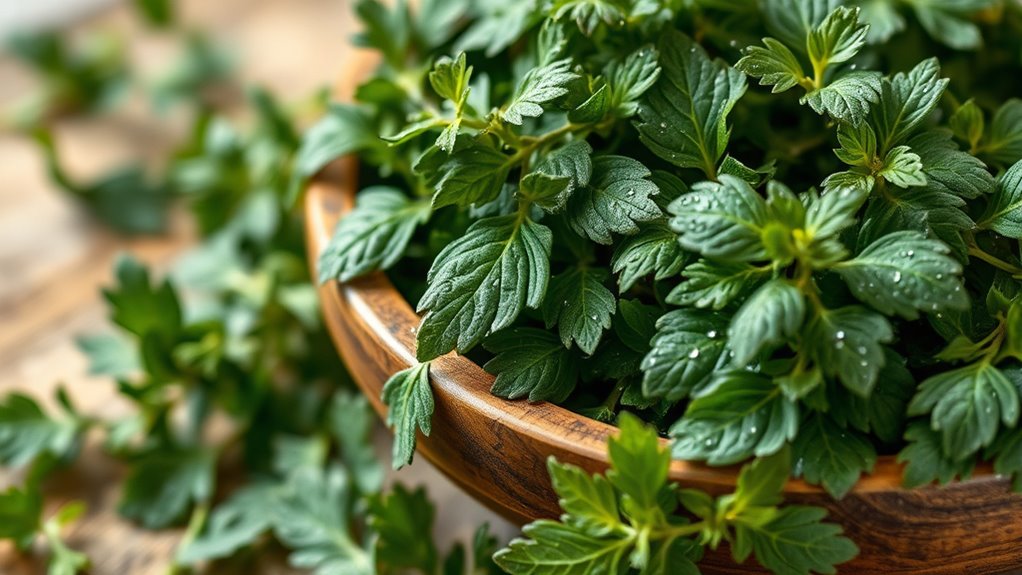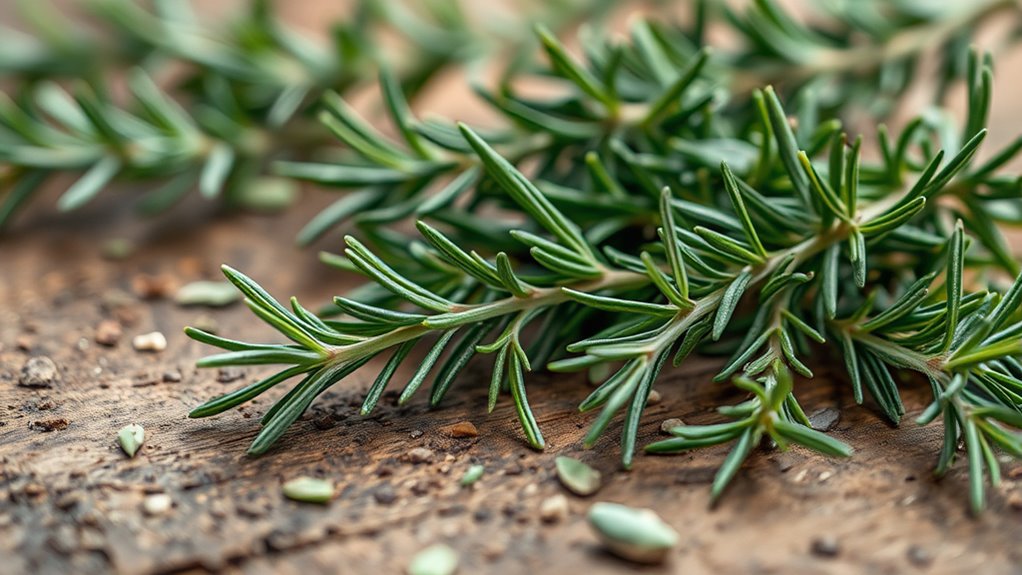To support bone mineralization naturally, include herbs like parsley, rich in vitamin K, basil with calcium and magnesium, oregano packed with nutrients and antioxidants, rosemary that boosts mineral content, thyme promoting overall bone health, sage providing essential nutrients, and cilantro high in vitamin K. These herbs are easy to incorporate into your meals, whether fresh or cooked, and can make a noticeable difference. Keep exploring how to maximize their benefits for strong, healthy bones.
Key Takeaways
- Herbs like parsley, basil, oregano, rosemary, thyme, sage, and cilantro are rich in nutrients supporting bone mineralization.
- Incorporating these herbs into meals boosts intake of vitamin K, calcium, magnesium, and antioxidants essential for bone strength.
- Cultivating fresh herbs enhances their nutrient content and bioavailability for improved bone health benefits.
- Culinary techniques such as chopping, cooking, and drying release essential oils and nutrients to maximize absorption.
- Regular use of these herbs in salads, soups, and dishes supports natural bone mineralization and reduces osteoporosis risk.
Parsley: A Rich Source of Vitamin K and Bone Support

Parsley is a powerhouse herb when it comes to supporting bone health, primarily because of its high vitamin K content. When you’re exploring herb cultivation, parsley is an easy herb to grow, whether in your garden or containers. Its versatility in culinary uses makes it a popular choice to add flavor and nutrients to your dishes. You can chop fresh parsley into salads, sprinkle it over soups, or blend it into sauces. As you incorporate parsley into your meals, you’re also boosting your intake of vitamin K, which plays a crucial role in bone mineralization. Its bright flavor and health benefits make it a valuable addition to your kitchen and your bone health regimen. Growing and using parsley is a simple way to support your overall wellness.
Basil: Enhancing Bone Density With Its Nutrients

Basil is packed with nutrients that support your bones, including calcium, magnesium, and vitamin K. These minerals play a vital role in maintaining bone strength and density. Incorporating basil into your diet can give your bones the nutrients they need to stay healthy. Additionally, these nutrients may contribute to bone mineralization, helping to strengthen your skeletal system over time. Consuming herbs like basil can also promote overall bone health, which is essential for preventing fractures and osteoporosis as you age.
Nutrients Supporting Bones
Because of its rich nutrient profile, basil can play a valuable role in supporting bone mineralization. It contains essential vitamins and antioxidants that contribute to overall bone health, making it a useful addition to herbal medicine and bone health supplements. By including basil in your diet, you harness nutrients that promote stronger bones and reduce the risk of osteoporosis. Its nutrient combination supports collagen production and mineral absorption, crucial for maintaining bone density. Additionally, incorporating top-rated supplements can further enhance your bone health regimen.
Basil’s Mineral Content
Have you ever wondered how herbs like basil can support your bone health? Basil is rich in minerals essential for bone mineralization, making it a valuable addition to your diet. Its mineral content includes calcium, magnesium, and potassium, which work together to strengthen bones. When you cultivate basil, you’re not only growing a versatile herb for culinary uses but also boosting your nutrient intake naturally. Understanding herb cultivation helps you maximize its mineral benefits. Here’s a quick look at basil’s key minerals:
| Mineral | Role in Bone Health | Daily Source |
|---|---|---|
| Calcium | Builds bone density | Leafy herbs, dairy |
| Magnesium | Aids mineral absorption | Nuts, seeds |
| Potassium | Reduces bone loss | Bananas, basil |
Incorporate basil into your meals to enjoy these benefits firsthand.
Oregano: A Potent Herb for Bone Strengthening

Oregano stands out as a powerful herb for strengthening bones, thanks to its rich profile of nutrients and bioactive compounds. Its distinctive oregano flavor not only enhances dishes but also provides health benefits. You can easily incorporate oregano into your meals, benefiting from its calcium, magnesium, and antioxidants that support bone mineralization. Oregano cultivation is straightforward, making it accessible for home gardeners and cooks alike. By adding fresh or dried oregano, you boost your intake of nutrients that promote bone health naturally. Its active compounds may also reduce inflammation, further supporting bone strength. Whether sprinkled on salads or simmered into stews, oregano offers a flavorful way to help maintain healthy bones. Embrace this potent herb for a delicious and nutritious addition to your diet.
Rosemary: Boosting Bone Mineral Content Naturally

Rosemary is a powerful herb that can help increase your bone mineral content naturally. Its rich supply of minerals supports the development and maintenance of strong, healthy bones. Incorporating rosemary into your diet could be a simple way to enhance your bone density over time. Practicing creative exploration can also inspire new ways to include herbs like rosemary in your meals. Additionally, some studies suggest that certain essential nutrients found in herbs like rosemary may contribute to better mineralization of bones.
Rosemary’s Mineral Boost
Although often celebrated for its aromatic flavor, rosemary also contains compounds that can support bone health by enhancing mineral content. Its herb cultivation is relatively simple, making it a popular choice for home gardens and culinary uses. Including rosemary in your diet can help boost mineral intake naturally. You can sprinkle fresh or dried rosemary onto roasted vegetables, meats, or soups to enjoy its benefits. The herb’s essential oils and antioxidants contribute to mineral absorption, particularly calcium and magnesium, crucial for strong bones. Plus, rosemary’s versatility means you can easily incorporate it into everyday meals. By doing so, you not only elevate your dishes but also support your bone health through a flavorful, natural approach. herb cultivation is easy, making rosemary an accessible addition for many home cooks. Embrace rosemary’s dual role as a culinary herb and bone mineral booster.
Enhancing Bone Density
By incorporating rosemary into your diet, you can naturally enhance your bone density through increased mineral content. Herbal remedies like rosemary provide essential nutrients that support bone health, making them a valuable addition to your nutrition plan. Regular consumption may improve your bone density, which can be confirmed through bone density tests. These tests help track your progress and assess the effectiveness of incorporating herbs like rosemary into your routine. The phenolic compounds in rosemary, such as rosmarinic acid, contribute to mineral retention and strengthen bone structure. By making rosemary a staple in your culinary uses, you’re actively supporting your bones’ strength and resilience. This simple step can make a meaningful difference in maintaining healthy bones as you age.
Thyme: An Aromatic Herb That Promotes Bone Health

Thyme is a fragrant herb that not only enhances the flavor of your dishes but also supports bone health. Its rich supply of vitamins and minerals contributes to strengthening bones and preventing osteoporosis. You can enjoy thyme through various culinary uses, such as seasoning meats, vegetables, or adding it to soups. Additionally, thyme makes a delightful herbal tea that boosts your intake of bone-friendly nutrients. Its antimicrobial properties also help keep your immune system strong, indirectly supporting overall bone health. Incorporating thyme regularly in your diet is an easy way to benefit from its nutrients. Whether used fresh or dried, thyme’s aromatic qualities elevate your meals while providing essential minerals needed for healthy bones. Incorporating self watering plant pots can help grow thyme and other herbs effectively, ensuring consistent moisture for optimal growth. Plant care techniques are essential for maintaining healthy herbs in such containers. Proper watering methods and regular pruning further enhance herb vitality and nutrient availability, supporting your overall health. Additionally, understanding toilet flushing mechanisms can help you manage water use efficiently, conserving resources while maintaining hygiene. Utilizing nutrient-rich soil can further improve herb growth and nutritional content, maximizing health benefits for your diet. Moreover, selecting the right herb varieties can influence the potency of beneficial compounds in thyme, enhancing its health-promoting properties.
Sage: Incorporating Its Nutrients for Better Bones

Sage is another flavorful herb that offers powerful nutrients to support your bone health. To maximize its benefits, focus on proper herb cultivation, choosing well-drained soil and ample sunlight. Incorporate fresh sage into your dishes using simple culinary techniques like chopping it into salads, soups, or stews. Cooking releases its essential oils and nutrients, making them more accessible to your body. Dried sage works well in seasoning blends or teas, but fresh herbs retain more of their nutrient profile. By integrating sage into your meals regularly, you help provide calcium, vitamin K, and antioxidants essential for bone mineralization. Experiment with different culinary techniques to keep your meals flavorful and nutritious while supporting your bone strength naturally.
Cilantro: A Fresh Herb Contributing to Bone Vitality

Cilantro is a vibrant herb that actively supports your bone health with its rich nutrient content. Its high levels of vitamin K, calcium, and antioxidants make it a valuable addition to your diet. When it comes to herb cultivation, cilantro is relatively easy to grow, whether in containers or garden beds, making fresh supplies accessible. Its culinary herb varieties, including flat-leaf and curly-leaf types, offer versatility in your favorite dishes. Incorporating cilantro into your meals not only enhances flavor but also boosts your bone well-being. Whether used in salads, salsas, or soups, this herb provides a revitalizing way to strengthen your bones naturally. Additionally, understanding the nutritional benefits of herbs like cilantro can help you make more informed dietary choices for overall health. Enjoy the benefits of this lively herb as part of your health-conscious culinary routine.
Frequently Asked Questions
Can Culinary Herbs Replace Traditional Bone Health Supplements?
You can’t rely solely on culinary herbs to replace traditional bone health supplements. While herbs have herbal potency and can support your diet through dietary integration, they typically don’t provide the concentrated nutrients needed for strong bones. Supplements are designed to deliver precise doses of calcium, vitamin D, and other minerals, which herbs alone may not supply consistently. Use herbs as a complementary approach, but don’t skip proven supplements for bone health.
How Much Herbal Intake Is Needed for Noticeable Bone Benefits?
You should follow herbal dosage guidelines to see noticeable bone health benefits, typically incorporating herbs like parsley, basil, or thyme daily in your meals. Aim for about 1-2 tablespoons of fresh herbs or 1 teaspoon dried herbs per serving. Track your bone health improvement metrics, such as improved mineral density or reduced pain, over several months. Consistency is key; herbal intake complements other bone-strengthening practices for ideal results.
Are There Any Side Effects From Consuming These Herbs Regularly?
You might think of herbal intake as seasoning a dish—too much, and it can spoil the flavor. Regular consumption of these herbs could lead to herb overdose or potential allergies, especially if you have sensitivities. Some herbs may cause side effects like gastrointestinal upset or allergic reactions if overused. Always start with small amounts, and consult your healthcare provider if you notice any adverse effects.
Do These Herbs Interact With Medications Affecting Bone Health?
You should be aware that some herbs can have herb-drug interactions, especially if you’re taking medications for bone health or other conditions. Certain herbs may also have herbal contraindications, so mixing them with your medications could affect their effectiveness or cause side effects. Always consult your healthcare provider before adding new herbs to your diet, especially if you’re on medication, to guarantee safety and avoid any adverse herb-drug interactions.
Which Herbs Are Most Effective for Osteoporosis Prevention?
Think of herbs like building blocks for your bones; to get the best results, focus on potent options like parsley, thyme, and rosemary. These herbs offer strong herb potency, supporting osteoporosis prevention. Follow dosage guidelines carefully—adding fresh herbs daily or taking herbal teas can boost your intake. Consistency is key; over time, the right herbs can help strengthen your bones and keep them healthy, like sturdy scaffolding.
Conclusion
By incorporating these flavorful herbs into your meals, you can naturally support your bone health and strengthen your framework. Each herb offers unique nutrients that contribute to better mineralization and overall significance. Isn’t it worth savoring delicious dishes that also bolster your bones? Embrace these culinary herbs daily, and you’ll enjoy both great taste and the confidence of nourishing your body from the inside out. After all, why not make bone health a flavorful part of your routine?










